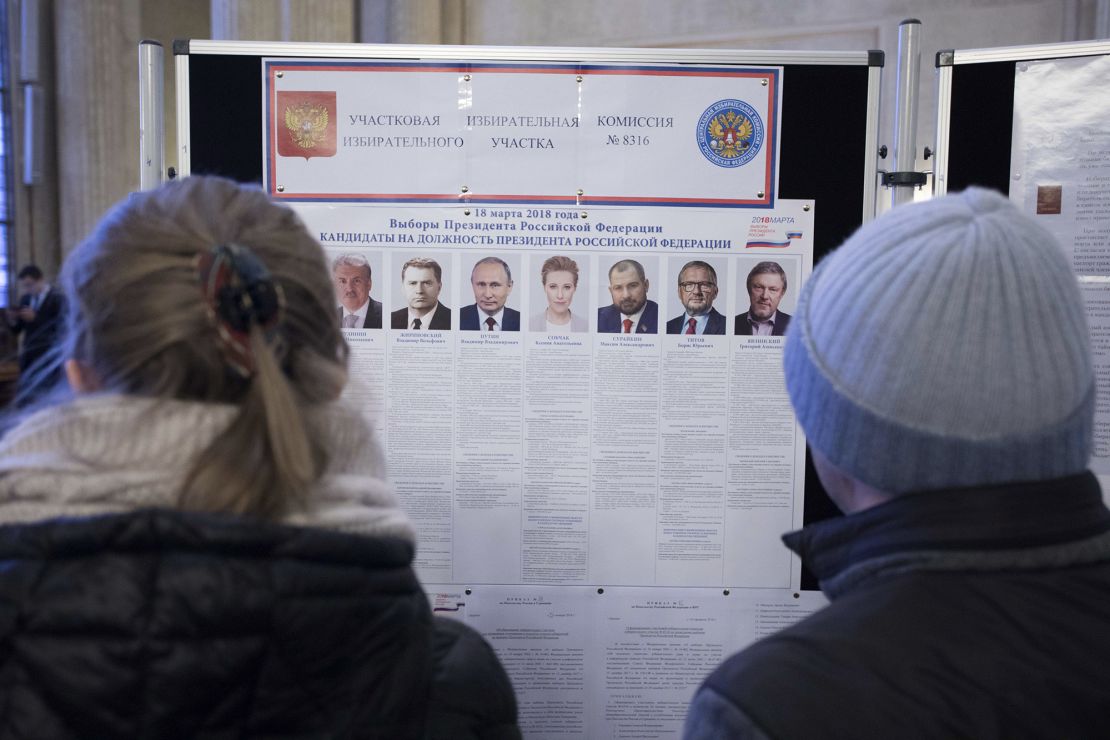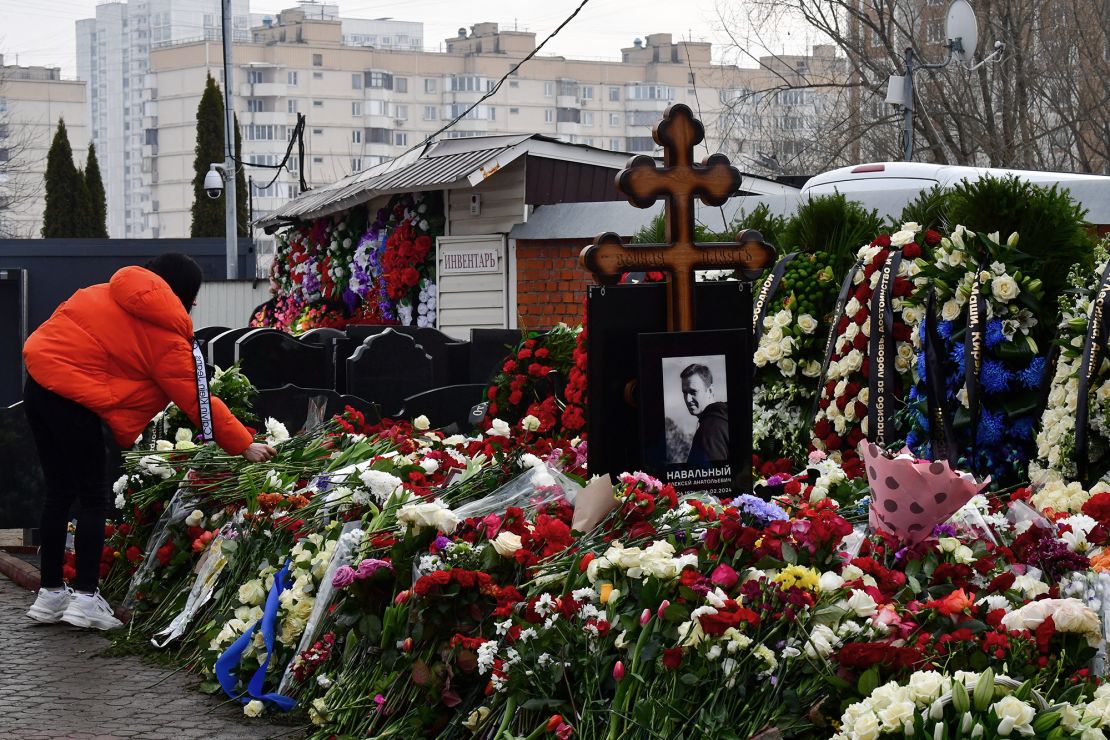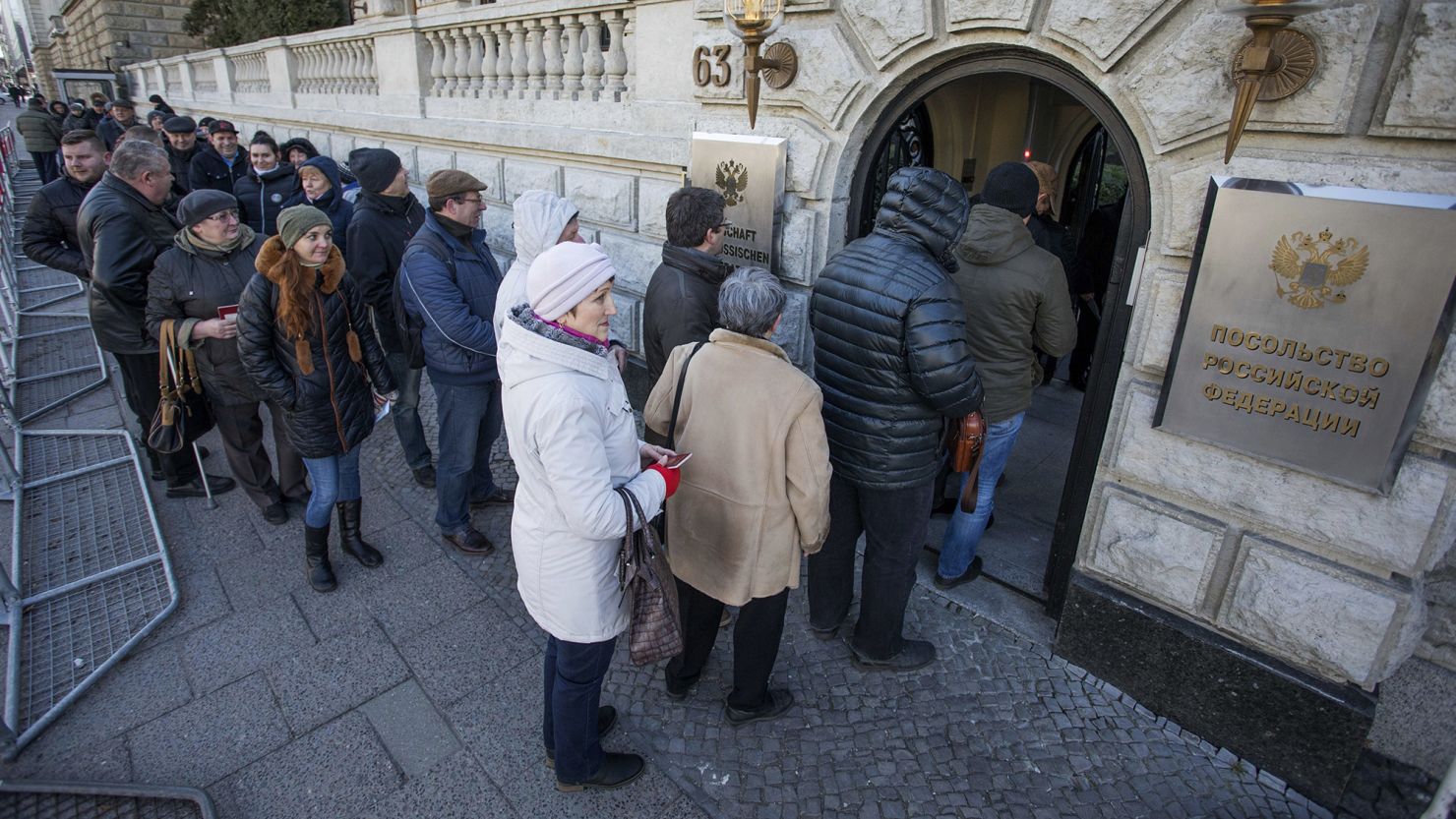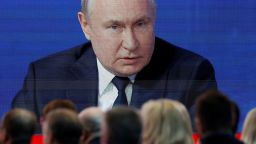Sergey Kulikov booked the first flight available out of Russia within days of the Kremlin announcing forced conscription and harsh punishments for wartime deserters in September 2022.
As a lawyer, Kulikov was concerned about how quickly the legislation was forced through. He felt there was no “fair court anymore” to seek legal protection, after Russia was excluded from the European Convention on Human Rights.
Now living in Dubai, he’s preparing to vote in Russia’s presidential election, despite the knowledge it will be marred by the same lack of fairness.
Still, Kulikov says voting is “the only available liberal and effective way to express protest both within Russia and from outside the country.”
“When people don’t show up at the ballot stations, it makes the job of falsification and stealing the votes so much easier,” he added.
Kulikov is one of hundreds of thousands of Russians who have fled the country since President Vladimir Putin launched a full-scale invasion of Ukraine in February 2022, ballooning the population of Russian nationals around the world.
The Russian Foreign Ministry has stated that expatriates – even those who left for states deemed “unfriendly” – will be allowed to vote in the presidential election on March 15-17. Russia’s Central Election Commission said that overseas voting will take place at 288 polling stations in 144 countries, Russian state media TASS reported.
During the 2018 presidential elections, 401 polling stations operated abroad and more than 475,000 people voted, according to the Central Election Commission as quoted by RIA Novosti. But this year, many overseas polling stations that operated in 2018 have been closed. It is unclear how many expatriates will turn up to vote, but the numbers are expected to be higher due to the mass exodus from Russia, with the potential for longer lines at overseas polling stations.
CNN spoke to several overseas citizens, all of whom were united in their unfavorable opinion of Putin – saying his regime was authoritarian, propagandist and abusing human rights.
But they said they had mixed feelings on the utility of voting?when there is no real viable alternative.

‘No good candidates’
“This election is not about choosing the right candidate. We all understand perfectly well which candidate will be chosen,” said Luba Zakharov, a 35-year-old data analyst who moved to Hamburg, Germany in March 2022. He’s planning to go all the way to Berlin to vote, given that the polling station in Hamburg will be shut. “Most likely I will spoil the ballot.”
Spoiling the ballot has become a popular strategy to show discontent, essentially voting for “none of the above” by marking the ballot incorrectly.
“There is no good solution in this election. There are no good candidates,” Zakharov added.
In February, the only anti-war candidate openly critical of Putin’s policies who gathered unexpected momentum, Boris Nadezhdin, was barred from running by the Central Election Commission. Thousands of Russians queueing across the country and abroad to sign in support of his candidacy proved a growing public demand for an alternative.
All three remaining candidates running against Putin on the official ballot – Vladislav Davankov, Nikolai Kharitonov and Leonid Slutsky – are widely considered to be reliably pro-Kremlin, leaving few options for voters looking for an alternative to the status quo.
The death of Russian opposition figure and outspoken Kremlin critic Alexey Navalny in prison last month punctuated a merciless crackdown on dissidence in Russia that has accelerated during its war with Ukraine. His death has been met with an outpouring of grief across the world, and inside Russia, where many viewed him as a symbol of hope for a different future. Navalny’s widow, Yulia Navalnaya, urged Russians last week to gather at polling stations on the final day of the elections, in a show of defiance.
Zakharov told CNN that in the wake of Navalny’s death, his motivation for showing up to the polls was to build connections with other opposition voters in Germany – ties that could one day be used to build a stronger system of support for Russians both inside and outside of the country.
“It is more important to demonstrate protest actions than to vote as it would be in a democratic election,” Zakharov said.
“Sometimes solidarity requires very little: just showing up,” he said. “For people abroad, there are no risks. We have nothing to lose.”
He said living abroad grants him the freedom to express opinions more openly and even assist political prisoners and Russians inside the country who are afraid to speak up.

‘Elections are all for show’
Other overseas citizens, like 35-year-old academic Anna, whose Jewish roots allowed her to move to Be’er Sheva, Israel, in 2022, prefer to opt out of voting altogether.
Anna, who asked to be identified only by her first name for fear of retribution, said participating in the poll only helps the Kremlin’s narrative that Russia is a democracy.
She believes a higher number of ‘stolen’ votes will highlight the blatant illegitimacy of the election.
“If Putin wins 96% of votes in this election, it will obviously be a totalitarian election,” Anna said. “Let them give my vote to Putin… I want the world media to come out with the headlines: There is a totalitarian regime in Russia.”
Putin is relying on this election to demonstrate that his war in Ukraine has the country’s support, even as the Russian economy is faltering under the weight of sanctions and hefty defense spending, according to Callum Fraser, a research fellow specializing in Russian foreign policy at the Royal United Services Institute (RUSI) think tank.
“Elections in authoritarian regimes are often used as a symbolic representation of the leader’s mandate to rule,” said Fraser. “This election is gearing up to be potentially the most manipulated in Russian history. While there will almost certainly be lower than 80% turnout, we can expect the official rhetoric to show figures within this ballpark.”
Fractured opposition
Fraser estimates that about 10% to 15% of Russia’s population are “extremely discontented with the system and are prepared to show it” but there is a much larger, apolitical segment of society that will stay home because they believe their vote is pointless.
“The true opinion of many Russians remains in their heads,” he said.
Even protests in the wake of Navalny’s death have not reached a level of “discontent that would worry Putin,” Fraser said, noting that Russia’s opposition “remains fragmented.”
There is no unified strategy for voters who oppose Putin, which reflects the long-standing absence of a consensus among the opposition.
?
Modern Russia’s opposition has struggled to coalesce into a unified force and tended to gravitate towards charismatic leaders. Alexey Navalny’s team currently stands out as one of the most popular wings of the opposition, yet it has largely been operating independently.
Meanwhile, some of the Kremlin’s most outspoken critics, such as opposition figures Ilya Yashin and Vladimir Kara-Murza, have been incarcerated, while others, like politician Boris Nemtsov and journalist Anna Politkovskaya, have been killed.
“Russia is not a democratic state,” Fraser emphasized. “The elections are all for show and will display a result that suits Putin’s narrative.”
The RUSI fellow does not believe that any votes, “especially those from ‘liberals’ that have fled the country and the SMO [Special Military Operation], will shift the result in any way.”
But that hasn’t deterred voters abroad from holding out hope.
“It is unlikely that anyone will achieve anything,” Kulikov, the lawyer now in Dubai, says. “But this is still an opportunity. There is always hope for a miracle in my heart. I am a Russian person; I believe in miracles.”


